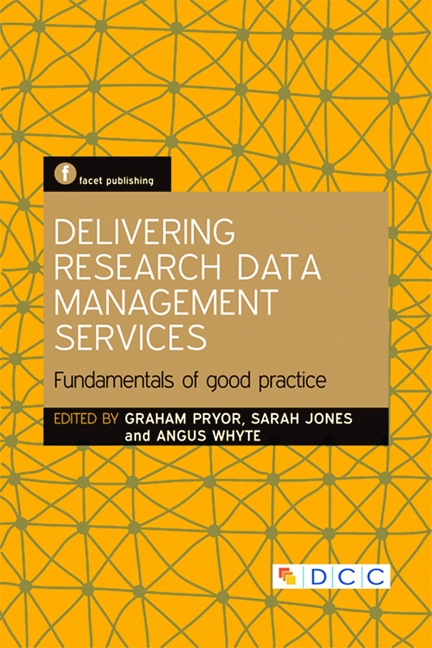Book contents
- Frontmatter
- Contents
- Preface
- Contributors
- 1 A patchwork of change
- 2 Options and approaches to RDM service provision
- 3 Who's doing data? A spectrum of roles, responsibilities and competences
- 4 A pathway to sustainable research data services: from scoping to sustainability
- 5 The range and components of RDM infrastructure and services
- 6 Case study 1: Johns Hopkins University Data Management Services
- 7 Case study 2: University of Southampton – a partnership approach to research data management
- 8 Case study 3: Monash University, a strategic approach
- 9 Case study 4: a national solution – the UK Data Service
- 10 Case study 5: development of institutional RDM services by projects in the Jisc Managing Research Data programmes
- Index
2 - Options and approaches to RDM service provision
Published online by Cambridge University Press: 08 June 2018
- Frontmatter
- Contents
- Preface
- Contributors
- 1 A patchwork of change
- 2 Options and approaches to RDM service provision
- 3 Who's doing data? A spectrum of roles, responsibilities and competences
- 4 A pathway to sustainable research data services: from scoping to sustainability
- 5 The range and components of RDM infrastructure and services
- 6 Case study 1: Johns Hopkins University Data Management Services
- 7 Case study 2: University of Southampton – a partnership approach to research data management
- 8 Case study 3: Monash University, a strategic approach
- 9 Case study 4: a national solution – the UK Data Service
- 10 Case study 5: development of institutional RDM services by projects in the Jisc Managing Research Data programmes
- Index
Summary
Carrots, sticks and the prospect of marginalization
Chapter 1 concluded with the assertion that, as a consequence of pressure from government and the major funders, institutions need quickly to identify measures that will deliver a sustainable approach to research data management (RDM) service provision. That said, it would be wrong for the selection of any such measures to proceed simply on the basis of an arbitrary tickbox response to the various carrots and sticks being proffered or waved by the agents of authority. There are other sound and persuasive reasons why researchintensive universities need to give serious thought to the development of RDM support, not least the benefits we shall outline in this chapter, during which process precedence over all other considerations must be given to the understanding that any measures adopted will be deemed fit for the specific needs and purposes of the individual institution. To ignore that caveat would be to guarantee wasted resource and an unpopular service.
Yet, faced with the potential loss of funding that is implicit in the EPSRC gambit, many institutions have felt compelled to develop roadmaps that will secure their compliance with this particular funder's expectations for data management. In some quarters of the sector this action has been taken in spite of an evident reluctance to accept that traditionally selfregulating organizations are being obligated in such an abnormally direct manner. Attitudes towards this obligation, and by association towards the perceived merits of research data management, were revealed in a survey of EPSRC grant holders conducted by the Digital Curation Centre (DCC) during August and September 2012. Whilst all responding institutions claimed either to have completed or to be in the throes of developing a roadmap, only 34% indicated that their roadmap would feature as a core component of a broader research data management strategy. Whilst a number of individual and generally positive comments suggested that the EPSRC's action had galvanized institutions into addressing a topic that until now had been widely neglected – even, it was said, offering a firm foundation for the development of good practice – there was also considerable resentment towards the imposition of yet another apparent administrative hurdle that research institutions would have to negotiate.
- Type
- Chapter
- Information
- Delivering Research Data Management ServicesFundamentals of Good Practice, pp. 21 - 40Publisher: FacetPrint publication year: 2013
- 6
- Cited by



